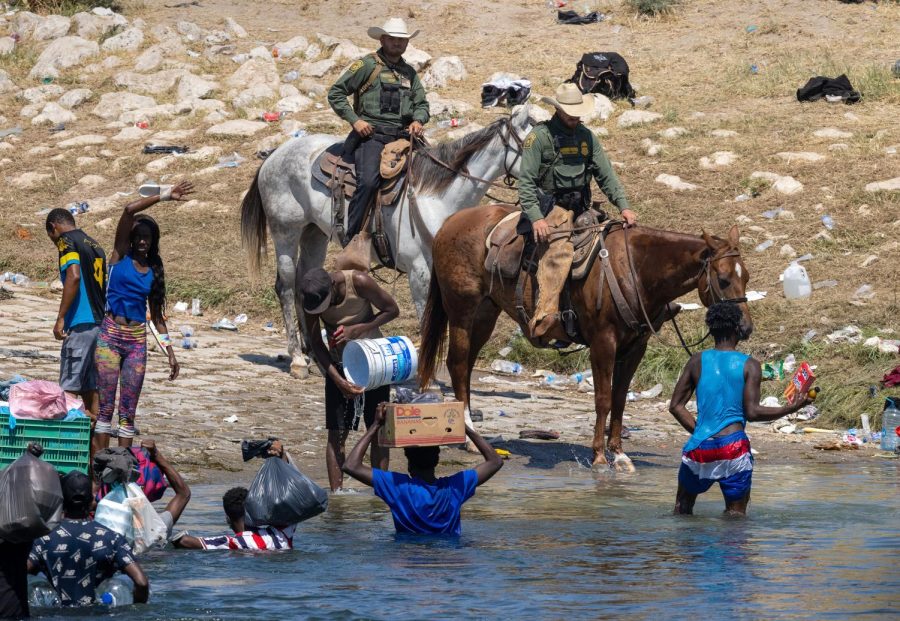Opinion | Asylum for Haitians is not optional
U.S. Border Patrol agents interact with Haitian immigrants on the bank of the Rio Grande in Del Rio, Texas on Sept. 20, as seen from Ciudad Acuna, Mexico. Columnist Eddie Ryan believes that it isn’t possible for Haitians to seek asylum from America because of the current administration.
Just before Haitian President Jovenel Moise’s murder last July, I was reading the definitive history of the country’s great revolution: CLR James’ “The Black Jacobins.” James’ work as a consummate historian and as a radical inspired many mid-20th century anti-colonial movements, and his famous subject hasn’t lost relevance.
The appalling treatment of Haitian migrants by the Joe Biden administration has already gained righteous mention in this paper. I cannot match the eloquence and feeling with which a fellow columnist has put the case for broad asylum, an argument which should convince any reader. Instead, I intend to provide some additional history.
The Haitian revolution fought during the last decade of the 18th century, defeated both France and Britain and marked the first successful slave revolt for independence. Led by Toussaint L’Ouverture, James’ protagonist, it both drew upon the French revolution and aided America. Yet, it also threatened the imperial order, emerging as a specter of Black freedom achieved through violence.
The United States is indebted to Haiti via a depressing historical irony. It was only because Napoleon’s army was so depleted in Haiti — then San Domingo — that he was willing to cede the Louisiana Purchase territory at such a low price. America was doubled in size.
In a cruel twist, however, the first successful slave uprising led to a massive expansion of slavery. That Thomas Jefferson ignored Thomas Paine’s exhortations not to extend it to the new territories in any form counts as one of the great stains on his record.
Get The Daily Illini in your inbox!
The U.S. went on not to acknowledge Haiti’s independence for nearly six decades. The 20th century brought sustained American imperial efforts to control and exploit it, including the Marine occupation of 1915-1934 which brought, according to historian Greg Grandin, a forced labor system reminiscent of slavery.
American administrations then backed the murderous and authoritarian Duvalier family, which ruled in Haiti from 1957-1986. In line with most of its Cold War foreign policy, this deepened American complicity in Haiti’s suffering.
This narrative grew slightly more complicated in the 1990s with Operation Uphold Democracy. In 1990, Jean-Bertrand Aristide became president in Haiti’s first democratic election in decades. The U.S. supported these elections, though not the leftist Aristide. In 1991, having incurred the enmity of Haitian elites, Aristide was deposed in a coup by Raul Cedrás and forced into exile.
This episode offers a fascinating lens through which to study the nuance of the American empire. The U.S. didn’t relish Aristide’s reformism and wasn’t initially motivated to defend the integrity of his election. President Bill Clinton could rely upon the general anti-interventionist sentiment the U.S. had fostered within its populace through previous imperialist ventures like Somalia to justify an arguably immoral noninterventionist stance.
What became Operation Uphold Democracy nevertheless revealed, lying fallow, the potential to steer American power in a moral direction.
Perhaps recognizing that there was no “noninterventionist” option, given that Haiti was essentially an American semi-colony in whose internal affairs the U.S. intervened almost daily, the Congressional Black Caucus pressured Clinton to act. Clinton’s eventual decision to deploy troops, after repeatedly giving a green light of sorts to Cedrás, succeeded in restoring Aristide to power.
This unfortunately does not earn it veneration. Given the prior history, American claims of fidelity to Haitian democracy were disingenuous at best. The conditions of Aristide’s restoration included coercion into U.S. friendly deals with the International Monetary Fund and the World Bank which financially crippled Haiti, and the CIA even had a leader of Cedrás’ killing squads on its payroll for information purposes.
Still, the concept of moral American action as atonement for past crimes against other countries remains valuable. Perhaps this intervention contained the seeds of such conduct, the kind most realizable today through an unconditional asylum for Haitian refugees.
Alas, instead we are treated to images of Border Patrol agents reenacting the slave catching system. Haiti is grappling with an array of crises, and Biden has opted to mimic his predecessor by continuing the Title 42 expulsions he began.
If elementary compassion for human suffering won’t do it, then this country needs to realize that granting asylum to Haitians — whether they come from Haiti or secondary locations like Brazil and Chile — is the least it could do to make up for its rather direct hand in their suffering.
Eddie is a junior in LAS.




